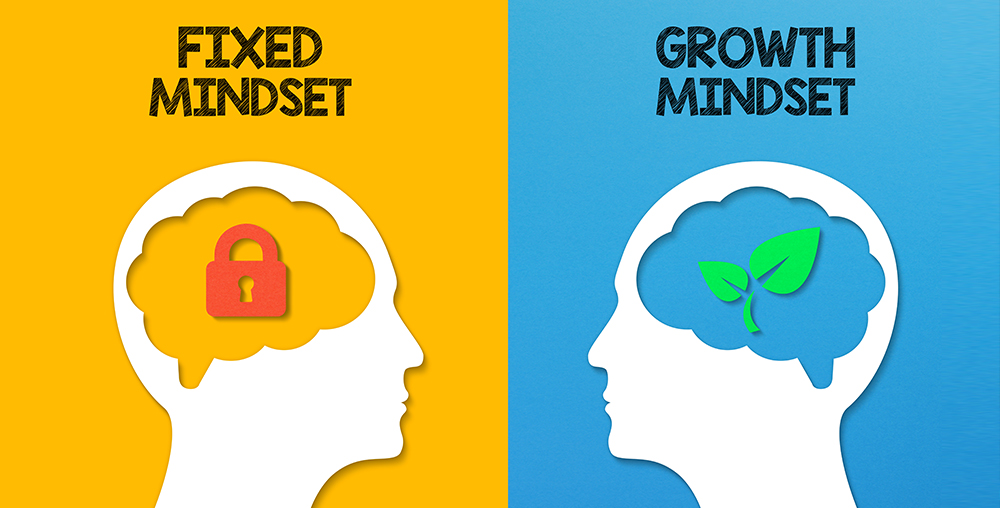
By Jon Kaupla
Many leadership development programs focus on the skills and knowledge topics leaders need to succeed. Typical topics include financial and business acumen, change management, problem solving, innovation, delegation, executive presence, etc.
And while these skills and knowledge topics are important, I would argue that mindset is more critical. Mindset refers to attitudes, beliefs, and values which shape one’s perceptions, behaviors, and decision-making. A leader’s mindset can separate a great leader from a good one and an effective leader from a struggling one.
Imagine you’re facing a challenging situation as a leader. Likely your mindset guided you through that situation by helping you make the right decision at the right time. And even though knowing the right skills and knowledge helped you, likely your mindset was your guide.
Social sciences have found four distinct mindsets that affect leaders’ ability to be most effective.
Growth and Fixed Mindsets
The terms “growth mindset” and “fixed mindset” were coined by Stanford psychologist Carol Dweck, who found through her research that people tend to fall into one of two categories when it comes to their beliefs about intelligence and abilities.
A growth mindset is the belief that one’s abilities and intelligence can be developed and improved through hard work, dedication, and learning from failure. People with a growth mindset tend to view challenges as opportunities for growth and see mistakes as valuable learning experiences. They are more likely to persist in the face of setbacks and are generally more resilient.
In contrast, a fixed mindset is the belief that one’s abilities and intelligence are largely predetermined and cannot be changed. People with a fixed mindset tend to avoid challenges for fear of failure and view mistakes as a reflection of their innate abilities. They are less likely to persist in the face of setbacks and may give up easily.
Leaders with a growth mindset are:
- More prepared to approach and take on challenges
- Seek and act on feedback
- Adopt the most effective problem-solving strategies
- Provide developmental feedback to direct reports
- Be intentional and persistent in accomplishing goals
Promotion and Prevention Mindsets
A promotion mindset focuses on achieving positive outcomes, such as gaining rewards or making progress toward goals. Individuals with a promotion mindset tend to be more eager, proactive, and risk-taking. They see opportunities, possibilities, and the potential for success.
On the other hand, a prevention mindset focuses on avoiding negative outcomes at all costs, such as preventing losses or maintaining safety and security. Individuals with a prevention mindset tend to be more cautious, vigilant, and risk averse. They see potential problems, threats, and the need to avoid failure.
Leaders with a promotion mindset are:
- More predisposed to positive thinking
- More open to change
- More likely to persist despite challenges and setbacks
- Demonstrate higher levels of task performance and innovative behaviors
Deliberative and Implemental Mindsets
Deliberative and implemental mindsets are two different ways of approaching tasks and decision-making processes.
A deliberative mindset involves careful consideration and analysis of options before deciding. People with a deliberative mindset tend to be reflective and thoughtful, taking the time to gather information and weigh the pros and cons of different choices. They often seek out a variety of perspectives and opinions before deciding.
On the other hand, an implemental mindset involves acting on and making decisions quickly. People with an implemental mindset tend to be more action-oriented and focus on getting things done efficiently. They are often less concerned with gathering a lot of information and instead prioritize taking action to move forward.
For leaders, having a more deliberative mindset can lead to better decision making because they are more impartial, more accurate, and challenge personal biases in their processing and decision making.
Learning and Performance Mindsets
Learning and performance mindsets are two different ways of approaching tasks and goals. A learning mindset focuses on the process of learning and growth while a performance mindset focuses on achieving specific outcomes and being evaluated on those outcomes.
In a learning mindset, leaders view challenges as opportunities for growth and improvement. They are open to feedback and are motivated by the desire to learn and develop new skills. Mistakes are seen as a natural part of the learning process, and leaders with a learning mindset often seek out new challenges and opportunities to expand their knowledge and abilities.
In contrast, individuals with a performance mindset are primarily concerned with achieving specific outcomes and being evaluated based on those outcomes. They may be motivated by external factors such as promotions or recognition, and they may be more hesitant to take on new challenges for fear of failure or evaluation.
At the Wisconsin School of Business Center for Professional & Executive Development, we prioritize mindset development in our programs. We believe that once leaders cultivate their mindsets, their attitudes, beliefs, and values will evolve. And with this evolution, leaders will positively re-shape their perceptions, behaviors, and decision-making in their day-to-day work.

Jon Kaupla is the executive director of the Wisconsin School of Business Center for Professional and Executive Development. He has over 18 years of human resources experience with organizations ranging from non-profits to Fortune 500 companies. Jon has led human resources strategy in the healthcare, financial services, marketing, and retail industries. Jon has a Bachelor of Science in psychology and social work from Florida State University and a Master of Arts in education from Alverno College.